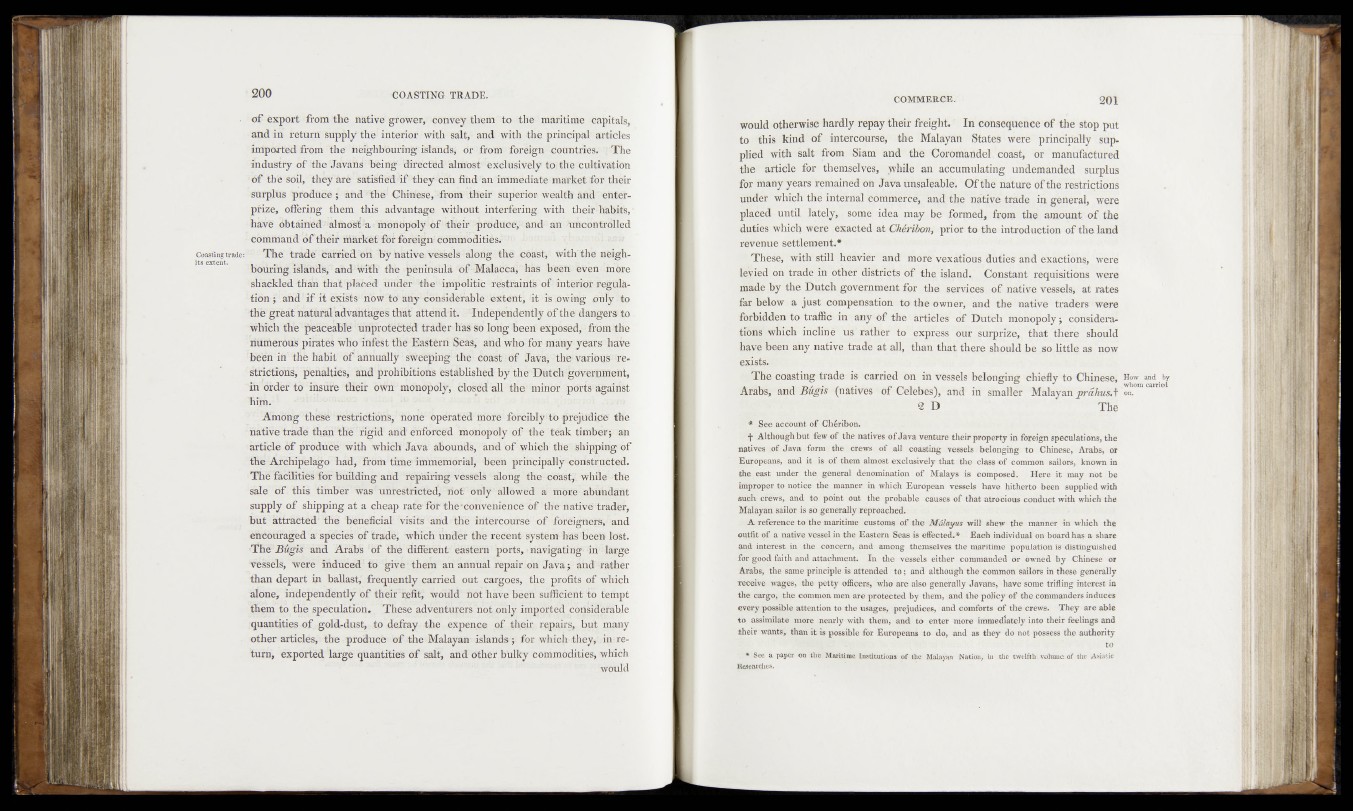
Coasting trade:
its extent.
of export from the native grower, eoïiveÿ them 'to the maritime capitals,
âûd in' return Supply the* ititefior with salt, - and with fchè principal articles
imported from the" neighbouring-'Maiidsj o r; from foreign COUntriosV :j 'The
lUduStty of the 'JâvaUS; bèing' directed almost11 exclusively töi the cultivation
of the soil, theÿ’àré satisfied if ' they tan find ran immediate market for their
Surplus 'prodticé ; ànePbhë- GMUésë,-‘fi'om their superior Wealth aiid efttef-
pxize, offering them this advantage without interfering with their-habits,'
have ôbtâinëâ-Altnoÿtja <ïhëriôpolÿ !ôf! -their-produce,-',and an 'Uncontrolled
Comiöand óf'their niarket fbr foreign commodities^-1 lJ
The trade1 fcafrifedori by Uative- vesselS- along the coast, with'the neighbouring
islands, ’ and- with the jpeniusùlà 'öf-Malacedihks been èvénfnöre
Shackled than that p l a c e d üifdèr 'the-rimpólitië Testmints of intériôr/regülà-
tion ; and if it exists'!hbw to any'considerable extent^ fit is .Owing OWly -to
thé gréât natural advantages that attend it. ’-Independently of-the1 dangers- to
which the ^âceàhié 'unprotééted trader has°só long been exposed, from-the
xiüiüeróus pirates who mfeSt 'th é Kastërn Seas, and who for- many- years hafa
bèénihfnë habit of* annually sweeping1 the- Coast I Of Various''‘restrictions,
pénütiès, and prohibitions established- by ‘the^DUtch'^Overn'menit,
ih óxdèrto insure their owff-’monopoly, closed ail- thé’ minor ipôrls'àgaifist
diitt.' *
Among 'thëaé' restrictions/ nortel" Operated tiiorë fèieiblj^tö ^tgiMipd the
native trade than the rigid and enforced monopoly of the téak tiinberj an
article óf produce with which Java abounds, and of Which-thel Shipping;'of
théA.fchipela^o had, 3fröm thne immemorial, heen prkicipàHyUoriStrücted.
The facilities for building and 1 repairing vessèls along thé: côastÿL 'wfefflébtlïe
sale of. this timber ' ’$as-r uhrestrictbdi mot-’iönly> allöwëd a tobte abundant
supply of shipping at a cheap ratëförthe*<»if\Uhrénédfóf-tBè‘:natiVëd;r&dfer,
but attracted' the beneficial- visits and the iritefcourse ' of' fórèigóe|s/'and
enCotiraged aspëfciésoftradéj -which under tKè-rèÓént1 systfeimhaSbeelf lóst.
The BÛgis and Arabs ’óf ffiè different' eastern ports, <-navigating- in large
‘Vessels, were induced tó ^iVè'Ltnèm an Annual repair on Java; and u-ajher
than depart ip ballast,' frequently carried op(. cargoes, thp pjcofttsuFw|dch
alone, independently of their'i^fit,1 would not "have beeU sufficient to tefhpt
them to the spéculation., These adventurers not. only imported considerable
•quantities of . gold-dust, to defray the expence of theii; repairs, but. many
;other articles, the produce of the Malayan islands; for whichthey*'jinireturn,
exported large quantities of salt, and other bulky commodities, which
would
would otherwise hardly repay their freight. ’ In consequence of the stop put
to this kind of intercourse, the Malayan States were principally supplied
With salt from Siam and the Coromandel. coast, or manufactured
the article for themselves, while an accumulating undemanded surplus
for many years remained on Java unsaleable. Of the nature of the restrictions
under Which the internal commercé, and the native trade in general, were
placed until lately, some idea may be formed, from the amount of the
duties whiçb were exacted at Ghéribm, prior to the introduction of the land
revenue settlement.*
■' These, with still .heavier and morè yexitïbus duties and exactions, were
levied on trade in other districts of the island. Constant requisitions were
made by the Dutch government for the services of native vessels, at rates
far below a just compensation to the owner, and the native traders were
forbidden to traffic in any of the articles of Dutch monopoly ; considerations1
which incline us ' rather to express ' our surprize, that there should
Havé been any native trade at all, than that there should be so little as now
exists. -
The coasting trade is carried on in vessels belonging chiefly to Chinese,
Arabs, and Bógts (natives of Celebes), and in smaller Malayan prâhusA
2 D The
* See account of Chêribon.
f Altboughbut few of the natives of Java venture their property in foreign speculations, the
natives .of Java form the crews of all coasting vessels - belonging to Chinese, Arabs, or
Europeans, and it is of them almost exclusively that the class of common sailors, known in
the east under the general denomination of Malays is composed. Here it may not be
improper to notice the manner in which European vessels have hitherto been supplied with
such crews, and to point out the probable causes of that atrocious conduct with which the
Malayan sailor is so generally reproached.
A reference to the maritime customs of the MMayus will shew the manner in which the
outfit of à- native vessel in the Eastern Seas is effected-* Each individual on board has a share
and interest in the concern, and among themselves the maritime population is distinguished
for ggç.d faith and attachment. In the vessels either commanded or owned by Chinese or
Arabs, the same principle is attended to ; and although the common Bailors in these generally
receive wages, the petty officers, who are also generally Javans, -have some trifling interest in
the cargo, the common men are protected by them, and the policy of the commanders induces
every possible attention to the usages, prejudices, and comforts of the crews. They are able
to, assimilate more nearly with them, and to enter more immediately mW then feelings and
their wants, than it is possible for Europeans to do, and as they do not possess the authority
. . to * See a paper on the Maritime Institutions of the Malayan Nation, ill the twelfth volume Ueje&fches. of the Asiatic
Hów aad by .whom carried